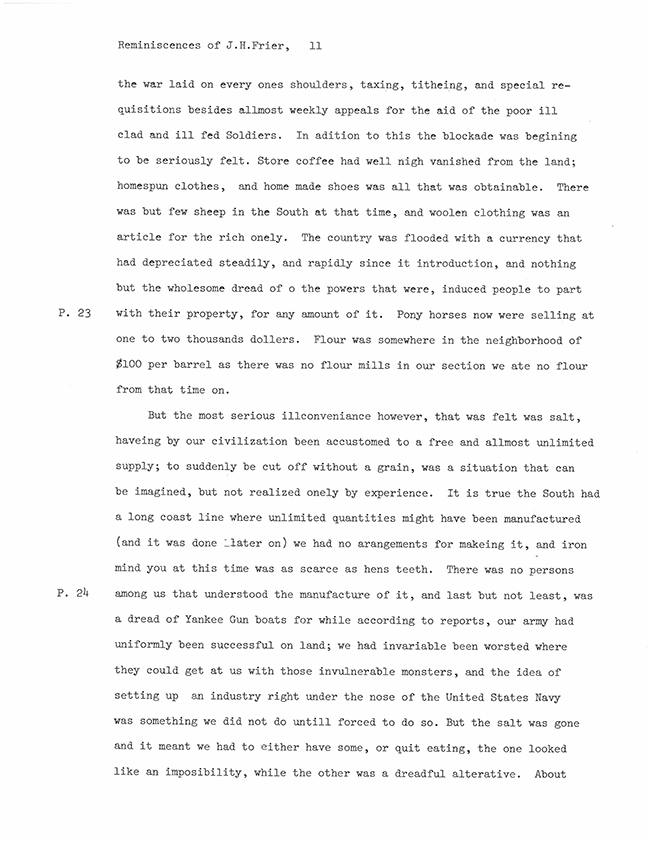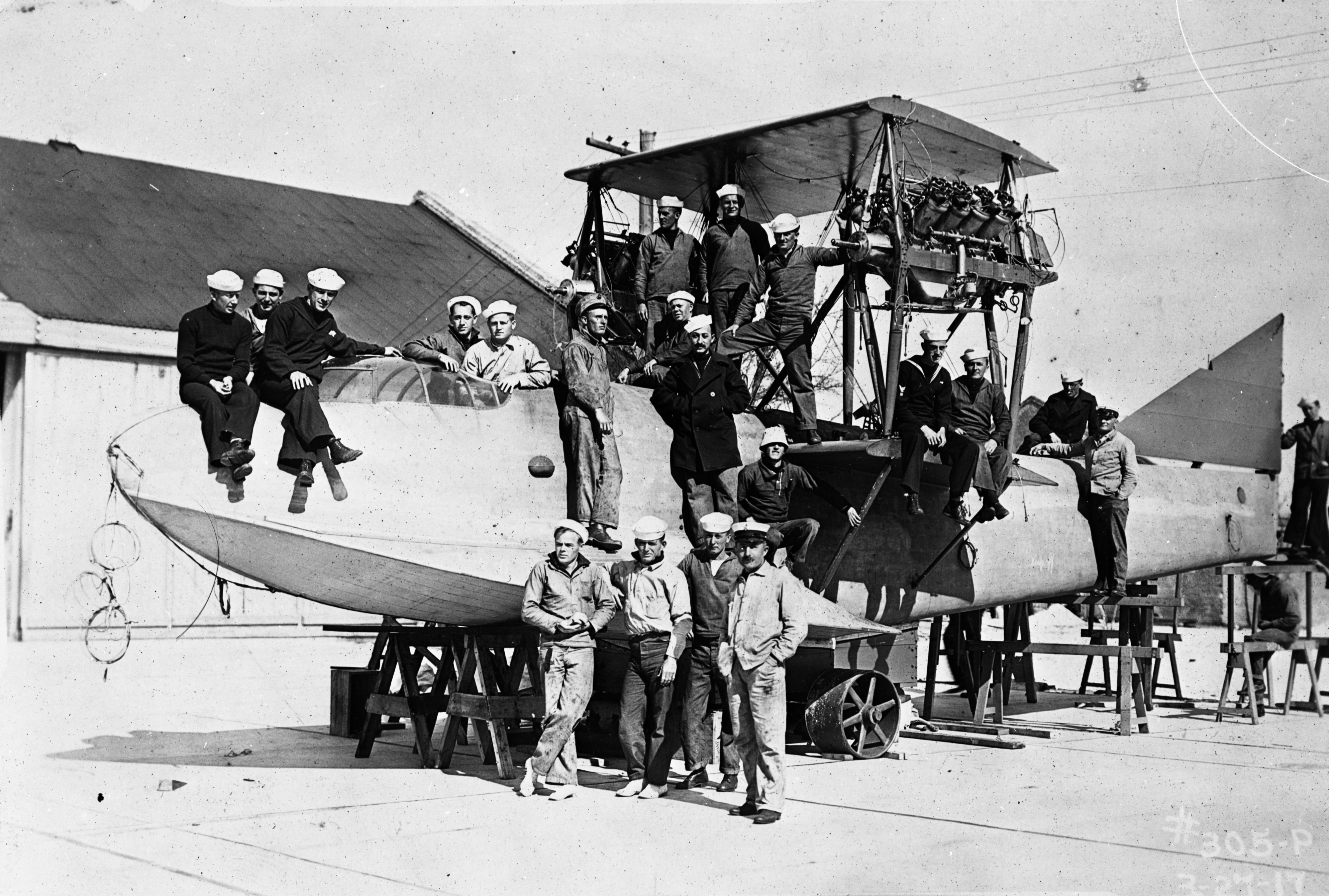Florida in the Civil War
Documents
Excerpt from Joshua Hoyet Frier's Civil War Memoir
(From: Frier, Joshua Hoyet, 1847-1903, Collection M76 - 134)
On his 17th birthday, May 20, 1864, Joshua Frier enrolled in a Florida militia company that eventually became the 1st Florida Reserves, Company B. The unit remained in north Florida throughout its service. Joshua Hoyet Frier wrote a memoir entitled Reminiscences of the War Between the States by a Boy in the Far South at Home and in the Rank of the Confederate Militia. He did not write this memoir until the late 1890s, 30 years after the war had ended.
These excerpts deal with the shortage of salt during the war and the Battle of Natural Bridge.

... In addition to this the blockade was beginning to be seriously felt. Store coffee had well nigh vanished from the land; homespun clothes, and homemade shoes was all that was obtainable. There was but few sheep in the South at that time, and woolen clothing was an article for the rich only. The country was flooded with a currency that had depreciated steadily, and rapidly since its introduction, and nothing but the wholesome dread of the powers that were, induced people to part with their property, for any amount of it. Pony horses now were selling at one to two thousand dollars. Flour was somewhere in the neighborhood of $100 per barrel as there was no flour mills in our section we ate no flour from that time on.
But the most serious ill convenience however, that was felt was salt, having by our civilization been accustomed to a free and allmost [sic] unlimited supply; to be suddenly cut off without a grain, was a situation that can be imagined, but not realized only by experience. It is true the South had a long coast line where unlimited quantities might have been manufactured (and it was done later on) we had no arrangements of making it, and iron mind you at this time was as scarce as hens teeth. There was no persons among us that understood the manufacture of it, and last but not least, was a dread of Yankee gun boats for while according to reports, our army had uniformly been successful on land; we had invariable been worsted where they could get at us with those invulnerable monsters, and the idea of setting up an industry right under the nose of the United States Navy was something we did not do until forced to do so. But the salt was gone and it meant we had to either have some, or quit eating, the one looked like an impossibility, while the other was a dreadful alternative. About
[image 2]
this time some inventive person discovered that by taking up the dirt out of the meat houses, and leaching it a fair article of salt could be made; this he published for the good of suffering humanity. Next day all hands went to work, erecting hoppers to leach the earth in, and improvising furnaces for the evaporation of the water after it had leached out the precious property, late in the evening we took a small run off, the product of which was about one gallon of I hardly know what to call it, it looked much more like mud than salt; but it was salty any how. The water leached abundance of other matter out of the meat house soil besides salt, but for the sake of what little salt there was in it we manufactured several bushels of it; and that winter 1862-63 we saved our pork with it. A piece of pork liberally smeared with it had the appearance of being wallowed in the mud. But even a new danger confronted us; the supply of dirt was limited, in fact it was all utilized the first season. So at the dawn of 1863 the prospect of a Salt famine added gravity to the already grave situation.
However the people with the true spirit of American enterprise addressed themselves to the situation and before hogs was slaughtered the next season all the available marsh lands on the coast was one vast salt works, and you could get all the salt you wanted at fifteen dollars a bushel, by hauling it nearly one hundred miles.
The salt works was unique affairs and many interesting chapters could be written about them what kinds of vessels was used for evaporating the brine which included every conceivable iron vessel from a dinner pot, to an engine boiler split in halfes [sic] each half being converted into an open kettle; how they worked in continual expectation of gales, high tides and Yankees. Nor arrangements for storing was made any where on the coast for the obvious reason it would only have been an invitation to the Marines to come out, and destroy it, which invitation they would have been quick in
[image 3]
accepting.
They would occasionally come out and turn out the kettles, and knock holes in them for miles up and down the works. These same vessels would be patched and plugged, and made to do service until they came out again, and broke them into little bits of pieces. Sometime a gale would come up and flood the works when they would have to flee to save their lives such an occurrence in the night always resulted in great loss of property for besides dissolving great quantities of salt, tearing up furnaces, carrying off quantities of wood, frequently carried away all their provision, feed, and camp equipments.
For all this there was a peculiar fascination in “making salt” that caused some to follow it during the war. I might add that one of the principle charms of the salt works was that it was too near the Yankee gun boats for enrolling officers (Conscript Officers) to be meddlesome as they was making them selves in the interior. To a good many they was making life a burden by threatening and pretending they was going to send them off. Of course they were not subject to the conscription act but they knew that the Government hated to lose the opportunity of an able bodied man even though he was over age; so you see the grounds for such worriement.

 Listen: The Folk Program
Listen: The Folk Program